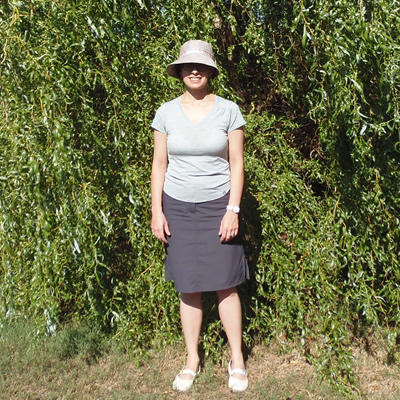 Dr. Sabrina Spatari, an assistant professor in the Civil, Architectural, and Environmental Engineering Department at Drexel University is a member of two separate research teams who were recently awarded USDA funding for projects involving the production of biofuels. Spatari’s role in both research efforts is to perform Life Cycle Assessment (LCA) on the production of biofuels generated from the following feedstocks: switchgrass, equine waste, woody biomass/forestry residue and energy sorghum. Life cycle analysis is an analytical tool or method used to systemically capture environmental impacts as well as potential human health risks. Spatari’s research using LCA is an important component for these research teams to determine the feasibility and effectiveness of biomass development using these previously mentioned feedstocks.
Dr. Sabrina Spatari, an assistant professor in the Civil, Architectural, and Environmental Engineering Department at Drexel University is a member of two separate research teams who were recently awarded USDA funding for projects involving the production of biofuels. Spatari’s role in both research efforts is to perform Life Cycle Assessment (LCA) on the production of biofuels generated from the following feedstocks: switchgrass, equine waste, woody biomass/forestry residue and energy sorghum. Life cycle analysis is an analytical tool or method used to systemically capture environmental impacts as well as potential human health risks. Spatari’s research using LCA is an important component for these research teams to determine the feasibility and effectiveness of biomass development using these previously mentioned feedstocks.
The USDA has awarded a team of 10 investigators a total of approximately $7 million for the grant project entitled Distributed On-Farm Bioenergy, Biofuels and Biochemicals (FARMBIO3) Development and Production via Integrated Catalytic Thermolysis. Spatari’s portion of the award is $370,000. The thrust of this research is to develop an on-site technique for farmers to produce biofuels using feedstocks native to the US Northeast. The USDA’s Agricultural Research Service’s (ARS) Eastern Regional Research Center (ERRC) in Philadelphia is researching a biomass conversion process known as pyrolysis to determine if this technique can be incorporated into a portable design that is adaptable for use on-site in a farm setting. Pyrolysis is the process of heating organic material at a very high temperature in the absence of oxygen. This thermochemical process creates bio-char and bio-crude oil. Researchers seek to incorporate catalysts into these on-site pyrolysis reactors. The incorporation of these catalysts will produce a higher-grade bio-oil with a chemical composition that brings it closer to entering the mainstream fuel markets for infrastructure use (e.g. underground pipeline transport).
The overarching objective of this research is to address socio-economic and technical barriers that face on-site pyrolysis techniques for biomass conversion. This team of investigators will research, evaluate, and test catalyst developments to make it possible for farmers to produce renewable fuels made from feedstocks common to regional agricultural environments.
Spatari is also an investigator of a second USDA grant led by Ceramatec Inc., a company that innovates cleantech material technology. This grant, titled Lignocellulosic Biomass Conversion to Infrastructure Compatible Fuel, Products and Power, involves biomass research that focuses on the lignocellulosic properties of feedstocks; feedstocks that cntain high concentrations of cellulose which allow for more efficient biomass conversion. The intended outcome is to convert this lignocellulosic biomass to infrastructure compatible renewable diesel at relatively low costs. (Ethanol has high cellulose concentrations but also contains oxygen, thus making it not suitable for use in infrastructure such as underground pipelines)
These research efforts will focus on feedstocks that are plentiful in Texas. For example, energy sorghum thrives in the Texas climate and can also easily grow on underutilized parcels of land. Researchers will concentrate on the efficient production of energy sorghum to be converted into biomass in locations that are close to refineries as well as close to mainstream market insertion points. A major component of this research is to assess the rural socio-economic impacts of these biomass conversion techniques using Jobs and Economic Development Impact (JEDI) models. The desired outcomes of this research are to produce renewable sources of fuel that will provide rural farmers with year-round income, while keeping it affordable to manufacture by growing the feedstocks close to refineries and to the mainstream market insertion points.
CAEE’s department Dr. Patrick Gurian, a Co-Investigator, will be collaborating with Spatari to integrate a risk and uncertainty framework to assess life cycle environmental decision criteria. The total grant is $6.6 million and Spatari’s portion of the award is $600,000.
Sarah Colins
Research Development Coordinator
Civil, Architectural, and Environmental Engineering